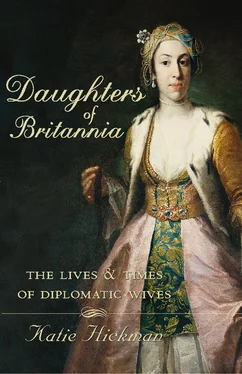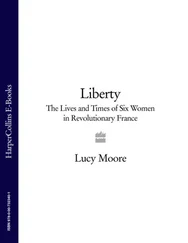cement for mending china and glass
Keatings insect powder
one or two pretty washstand wall-protectors
a comb and brush tray
bats, net and balls for lawn tennis
one or two table games
a small chest of tools including a glue pot
a small box of garden seeds
a small garden syringe
chess and backgammon
a few packs of playing cards
a Tiffin basket
Tropical Trials was, thankfully, by no means the only handbook of its kind to which a woman planning a life abroad could turn. Flora Annie Steel’s celebrated book The Complete Indian Housekeeper and Cook , first printed in 1888, was so popular in its day that it ran to ten editions. Although it was dedicated ‘To the English girls to whom fate may assign the task of being house-mothers in Our Eastern Empire’, its sound good sense and truly prodigious range of recondite advice – from how to deal with snake bite (‘if the snake is known to be deadly, amputate the finger or toe at the next joint …’) to how to cure ‘bumble foot’ in chickens – made it just as useful to diplomatic women living outside the empire.
Unlike the major, Annie Steel had no time at all for fripperies. * ‘As to clothing, a woman who wishes to live up to the climate must dress down to it,’ was her sensible advice. Frills, furbelows, ribbons and laces were quite unnecessary, she believed. None the less, the clothing which even she considered essential would have taken up an enormous amount of trunk space. ‘Never, even in the wilds, exist without one civilized evening and morning dress,’ she urged, and listed:
6 warm nightgowns
6 nightgowns (silk or thin wool) for hot weather
2 winter morning dresses
2 winter afternoon dresses
2 winter tennis dresses
evening dresses
6 summer tea gowns *
4 summer tennis gowns
2 summer afternoon gowns
1 riding habit, with light jacket
1 Ulster †
1 Handsome wrap
1 umbrella
2 sunshades
1 evening wrap
1 Mackintosh
2 prs walking shoes
2 prs walking boots
2 prs tennis shoes
evening shoes
4 prs of house shoes
2 prs strong house shoes 11
On the actual journey, however, circumstances were often rather more frugal than these preparations suggest. When Diana Shipton travelled to Kashgar it was so cold in the mountains that she and her husband put on every garment they possessed and did not take them off again for three weeks. On one of her journeys in Brazil Isabel Burton once went for three months without changing her clothes at all. Sometimes, though, such spartan conditions were imposed more by accident than by design. When Angela Caccia, her husband David and their newborn son were posted to Bolivia in 1963 they made the journey by sea, taking with them an enormous supply of consumer goods, from tomato ketchup to soap powder. This luggage came with them as far as Barcelona, where it was lost, leaving them to face the six-week ocean voyage with little more than the clothes they were wearing. For the baby they did have clothes, but no food; ‘David had 75 ties; I had 9 hats, and between us we had 240 stiff white paper envelopes.’
However, the journey itself was so entrancing that the Caccias soon forgot these inconveniences. Their route took them through the Panama Canal and then down the Pacific coast of South America to the Chilean port of Antofagasta, from where they took a train across the Atacama and up into the Andes. Angela was spellbound by the beauty of the desert, despite the fact that the air was so thin and dry that their lips cracked and their hands hissed if they rubbed them together as if they would ignite. The light was so intense, she recorded, that they wore dark glasses even inside their carriage with the curtains drawn. 12
Very few diplomatic women were as experienced, or as naturally adept at travelling as Ella Sykes – or certainly not at first. The journey to a posting was often a woman’s first taste of travelling abroad, and it left an indelible impression on her – although not always the same sense of wonderment experienced by Angela Caccia. Reading back over my mother’s very first letters, written during the six-week sea voyage out to New Zealand in 1959, I find, to my surprise (for I have always known her as the most practised of travellers), a note of apprehension in her tone.
I suppose quite shortly we shall really be at sea [she writes from her cabin aboard the S.S. Athenic ]. Atlantic rollers may begin, instead of the millpond the Channel has been up to now. We have been sailing in dense fog all day. It is a queer sensation to have thick mist swirling around with visibility about the length of the boat, the foghorn sounding every few minutes and bright sun shining down from above. We seem to be travelling at a snail’s pace.
It is also a surprise to be reminded that even then such a voyage was still considered a special undertaking. My parents arrived at the London docks to find themselves inundated with well-wishers.
We were taken straight to our cabin and found a large box of flowers from Auntie Olive, also from Betty and Riki, and telegrams from Hilary and Tony, J’s mother, Auntie Jo and Jack, Sylvia Gardener, and Richard Hickman. After the ship sailed at eight o’clock last night I found Mummy’s wonderful boxes of Harrod’s fudge and chocolates, and Hilary’s [my mother’s sister] stockings. Thank you so much both of you. It was all the nicer getting them then, after we had left the dock and were feeling a bit deflated. Thank you Mummy and Daddy also for the beautiful earrings, which J produced after dinner … I wonder if you realised how much I wanted something just like them?
There was no such send off for Isabel Burton when she took to the seas on her first posting in 1865. In her hotel room in Lisbon, where she stayed en route to Brazil, she was greeted by three-inch cockroaches. Although she could not know it then, it was only a taste of what was to come. ‘I suppose you think you look very pretty standing on that chair and howling at those innocent creatures,’ was Richard’s characteristically caustic response. Isabel reflected for a while, realized that he was right, and started bashing them instead with her shoe. In two hours, she recorded, she had a bag of ninety-seven.
For some women, the journey was the only enjoyable part of diplomatic life. The writer Vita Sackville-West loathed almost every aspect of it (the word ‘hostess’, she used to say, made her shiver), but her first impressions of Persia, recorded when she travelled there to join her husband, Harold Nicolson, in 1926, echoes the experience of many of these peripatetic wives. On crossing the border she wrote:
I discovered then that not one of the various intelligent people I had spoken with in England had been able to tell me anything about Persia at all, the truth being, I suppose, that different persons observe different things, and attribute to them a different degree of importance. Such a diversity of information I should not have resented; but here I was obliged to recognise that they had told me simply nothing. No one, for instance, had mentioned the beauty of the country, though they had dwelt at length, and with much exaggeration, on the discomforts of the way.
The land once roamed by the armies of Alexander and Darius had, to Vita’s romantic imagination, a kind of historical glamour that its contemporary inhabitants never quite equalled. It was ‘a savage, desolating country’, but one that filled her with extraordinary elation. ‘I had never seen anything that pleased me so well as these Persian uplands, with their enormous views, clear light, and rocky grandeur. This was, in detail, in actuality, the region labelled “Persia” on the maps.’ With the warm body of her dog pressed against her, and the pungent smell of sheepskin in her nostrils, Vita sat beside her chauffeur in the front seat of the motor car with her eyes fixed in rapt attention on the unfolding horizon. ‘This question of horizon,’ she wrote musingly later, ‘how important it is; how it alters the shape of the mind; how it expresses, essentially, one’s ultimate sense of a country! That is what can never be told in words: the exact size, proportion, contour; the new standard to which the mind must adjust itself.’ 13
Читать дальше












